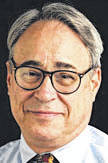
One example of the far-sighted thinking of this country’s founders was envisioning the differences between a partisan, populist House and a more deliberative Senate which, as George Washington purportedly told Thomas Jefferson, would “cool” the passions of the larger body.
That contrast is vividly on display in their very different approaches to the controversies surrounding special counsel Robert Mueller’s investigation.
In the Senate, despite continuing resistance from Majority Leader Mitch McConnell, some Republicans are joining Democrats in talking of ways to ensure Mueller’s independence and protect him from President Donald Trump’s repeated dismissal threats. In the House, key Republicans are putting pressure on the Special Counsel and his patron, Deputy Attorney General Rod Rosenstein, and seem less interested in investigating Trump than questioning the FBI handling of the 2016 probe of Hillary Clinton.
In a purely political sense, the Senate seems much more in step with the country. Recent Quinnipiac University and ABC/Washington Post polls showed strong majorities favoring a continuation of Mueller’s probe and opposing his ouster. The House reflects internal Republican pressures, a reminder (as in their earlier resistance to protecting DACA recipients) that Tea Party Republicans from solidly GOP districts are the principal barriers to a more cooperative approach to the country’s problems. They use their control of their Party’s House caucus to help Trump and block bipartisan compromises.
Three House GOP chairmen, Reps. Robert Goodlatte of Virginia, Devin Nunes of California, and Trey Gowdy of South Carolina, provided the latest example last Friday, demanding that Rosenstein promptly supply the memos in which ousted FBI Director James Comey contends Trump pressured him to stop probing possible Russian collusion with the president’s 2016 campaign.
“This is a set-up,” promptly tweeted Norm Eisen, former ethics chief in the Obama White House. “If he turns over, subject of an investigation (Trump) will learn evidence against him & tailor story; if he doesn’t, (he might be) fired.” Their goal, Eisen added, is “to put Rosenstein in a bind and create a pretext for termination.”
Firing Rosenstein would presumably be a first step toward removing — or reining in — Mueller. Earlier, Nunes threatened to seek impeachment of both Rosenstein and FBI Director James Wray for alleged FBI recalcitrance in providing documents to the House.
All three represent solidly Republican districts that may be able to withstand any Democratic wave next November (both Goodlatte and Gowdy are retiring). Friday’sletter was part of a pattern.
Judiciary Committee chair Goodlatte, whose Virginia district re-elected him with 60 percent of the vote and backed Trump by 66 per cent, has repeatedly sought to investigate FBI handling of its probe of Clinton’s private email server. He was also a key figure several years back in blocking House consideration of a Senate-passed immigration compromise.
Nunes, the Intelligence Committee chair, has spent more time colluding with the White House than investigating possible Trump campaign collusion with the Russians.
Gowdy, the chairman of the House Oversight and Government Reform Committee, is best known for leading the fruitless 2015 GOP probe into Clinton’s role in the deaths of four Americans in Benghazi. He has been the least nakedly partisan of the three, focusing lately on Environmental Protection Administrator Scott Pruitt’s blatant flouting of governmental ethics strictures. He has said several times the Special Counsel should be allowed to complete his work, a position also expressed by Speaker Paul Ryan and other Republicans not seeking re-election.
Meanwhile, key Senate Republicans are moving in the opposite direction from their House colleagues. After weeks of delay, Sen. Chares Grassley of Iowa, chairman of the Judiciary Committee, said he expects the panel to act next week on a bipartisan proposal to protect Mueller.
Nothing is guaranteed, given McConnell’s vow to keep any measure off the floor and panel in-fighting between Grassley and the ranking Democrat, Sen. Dianne Feinstein of California. But Grassley’s willingness to undertake an action he has long resisted exemplifies the different mindset in the closely divided Senate, where members from states with more centrist electorates hold the balance of power.
Those differences could be accentuated should Mueller conclude that Trump’s actions, including firing Comey, constitute obstruction of justice. There seems little chance the House, under current GOP management, would even consider impeaching Trump. That would change dramatically if Democrats win the House in November.
Then, the Senate would likely “cool” House passions in a different way, by failing to provide the required two-thirds support for conviction, even if Democrats win control.


